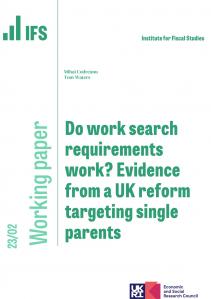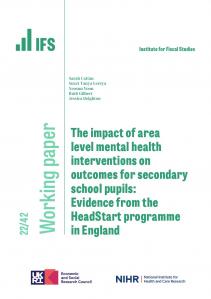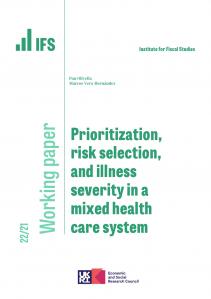Collection

After each Autumn Statement, Budget and Spending Review, we publish analysis of the Chancellor's proposals and reforms.
On Tuesday 29th November the Chancellor presented his Autumn Statement and the Office for Budget Responsibility published its latest Economic and Fiscal Outlook. On the following day, IFS researchers presented their analysis at a press briefing.
Slides are available here
- Opening remarks, Paul Johnson
- Public finances: Osborne sails close to the wind, Gemma Tetlow
- What does yesterday's news mean for living standards?, Robert Joyce
- Public sector pay and pensions, Carl Emmerson
- Policies for growth, Helen Miller
- Our analysis of the Spending Review examined the impact on public finances, public services and the distribution of income.
- In an IFS Briefing Note, The changing composition of public spending , Rowena Crawford and Paul Johnson show that spending on health, pensions and long term care is set reach half of all public spending over the next 50 years unless there is significant reform or unless total spending is significantly increased.
- In an IFS Observation, we examine the latest IMF 'Fiscal Monitor', which surveys public finance developments across the world and updates their fiscal projections, and take stock of how the planned fiscal consolidation in the UK compares to those currently planned in other advanced economies.
- IFS researchers assess the impact of the Office for Budget Responsibility's first 'Fiscal Sustainability Report' In July with an observation, Higher debt for decades?
- Against the backdrop of better-than-expected 2010-11 public finances, IFS Director Paul Johnson asked whether the Chancellor is right to stick with his programme of cuts in a June 2011 article for Prospect Magazine.
- In an IFS Commentary Mike Brewer, James Browne and Robert Joyce present forecasts of relative and absolute income poverty in the UK among children and working-age adults for each year between 2010-11 and 2015-16, and for 2020-21.
- In an IFS Commentary The impact in 2012-13 of the change to indexation policy, researchers show that indexing benefits in line with a measure of inflation using the Consumer Prices Index rather than that measured by the Retail Prices Index or the Rossi index, means that many benefit recipients will be worse off.
- The UK recently experienced its worst recession for over sixty years, and large falls in GDP were seen across many other developed countries. As part of a cross-country study, IFS researchers examined the effects of this recession on UK households.
- In an IFS Commentary Poverty and Inequality in the UK: 2011 IFS researchers assess the changes to average incomes, inequality and poverty that have occurred since 1997, with a particular focus on the changes that have occurred in the latest year of data (2009-10).
- In July IFS launched its first iPhone app, which estimates where in the income distribution you and your household fit in.
- In an article in Public Service Magazine Carl Emmerson argues that public service pensions could be redesigned to provide better value for taxpayers.
- In the IFS Green Budget 2011 we analyse the strategies the government could follow to reduce the public sector pay bill: cutting pay levels, cutting the size of the workforce and reforming public sector pensions.
- In an IFS observation Public service pension reforms: an improved structure, but impact on generosity and cost as yet unknown we look at Lord Hutton's final report on public service pensions and examine the possible effects of reform.
- In an IFS observation Public-service pensions: more reform needed we look at Lord Hutton's interim report on public service pensions and suggest key issues to consider when future reforms are recommended.
- An IFS Briefing Note on trends in education and schools spending we produce new estimates of the likely cuts to overall public spending on education in the UK up to 2014-15.
- Following the announcement in March 2011 that a new bursary scheme will replace the Education Maintenance Allowance (EMA), Haroon Chowdry and Luke Sibieta analysed how this fund could be structured and its potential impact on students.
- On first hearing that the Government planned to withdraw the Education Maintenance Allowance (EMA) in favour of a more efficient and cost-effective scheme, researchers produced an IFS observation An efficient maintenance allowance? which examined the impact and effectiveness of EMA payments.
- An IFS Observation Rate cutting, base broadening: a reduced incentive for investment? analyses the coalition's corporate tax policies and looks at how the package of measures will alter the tax burden and affect the UK's competitiveness.
- In an IFS Briefing Note, researchers describe trends in UK productivity over the recent recession - which ran from the first quarter of 2008 to the last quarter of 2009 - and how they compare with those in the US.
- New evidence suggests that Chinese inventors have the capacity to engage in research at the technology frontier. Such trends have fuelled widespread concerns over Western economies' ability to maintain their dominance in knowledge creation and high skill employment. In China is investing rapidly in skills and science: UK should do the same, an IFS Observation, Rachel Griffith and Helen Miller argue that innovation is not a zero-sum game and the success of China need not be at the expense of the West.
- Budget 2011: the big news is the old news (Paul Johnson, opening remarks)
- Public finances: weaker outlook reduces room for manoeuvre (Gemma Tetlow, presentation slides)
- Personal tax and benefit changes (James Browne, presentation slides)
- Business taxes and 'the plan for growth' (Helen Miller, presentation slides)
- Indirect and environmental taxes (Andrew Leicester, presentation slides)
On Wednesday 23 March we published an initial analysis of Chancellor George Osborne's 2011 Budget statement.
The IFS Green Budget 2011 - produced in collaboration with Barclays Capital and Barclays Wealth - focused on the policy challenges confronting the Chancellor of the Exchequer in advance of the 2011 Budget. IFS researchers examine the outlook for the public finances, assess a number of the key issues relating to the planned public spending cuts and discuss possible decisions on taxation. Barclays analysts look at the outlook for the macro-economy, and the implications for markets.
Our analysis for the election looked at Labour's record and at the parties' proposals. The work was funded by the Nuffield Foundation.
Collection details
- Publisher
- IFS
More from IFS
Understand this issue

Election Special: Your questions answered
27 June 2024

Election Special: The big issues politicians haven't spoken about
25 June 2024

Cuts to council services likely unless cost pressures abate – even with the biggest council tax increases for 20 years
21 June 2024
Policy analysis

How would the parties’ tax and spending plans affect Scotland and Wales?
28 June 2024

How should we interpret parties’ public spending pledges this election?
23 June 2024

Main parties’ manifestos tell us little about the funding individual public services would actually receive
23 June 2024
Academic research

Do work search requirements work? Evidence from a UK reform targeting single parents
1 February 2023

The impact of area level mental health interventions on outcomes for secondary school pupils: Evidence from the HeadStart programme in England
13 October 2022

Prioritization, risk selection, and illness severity in a mixed health care system
16 June 2022